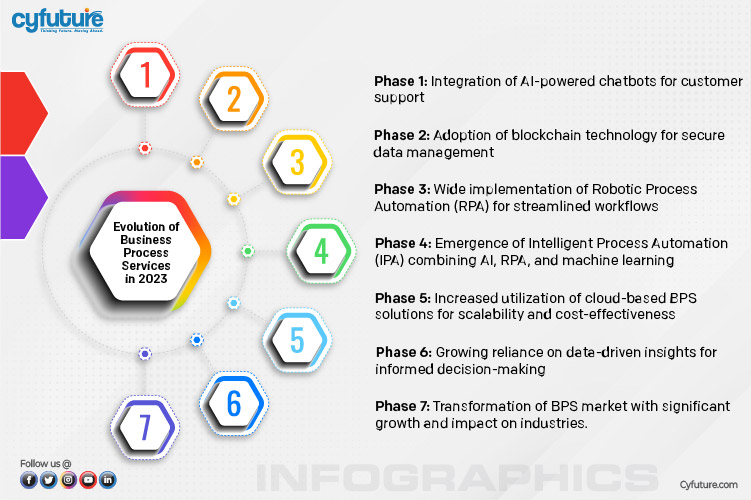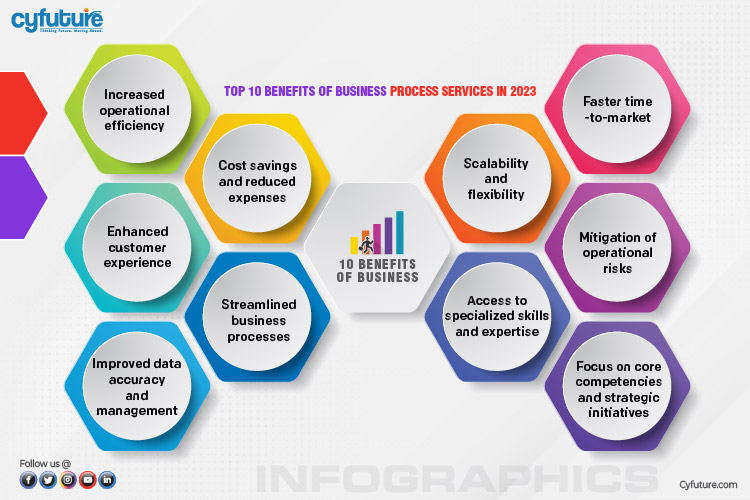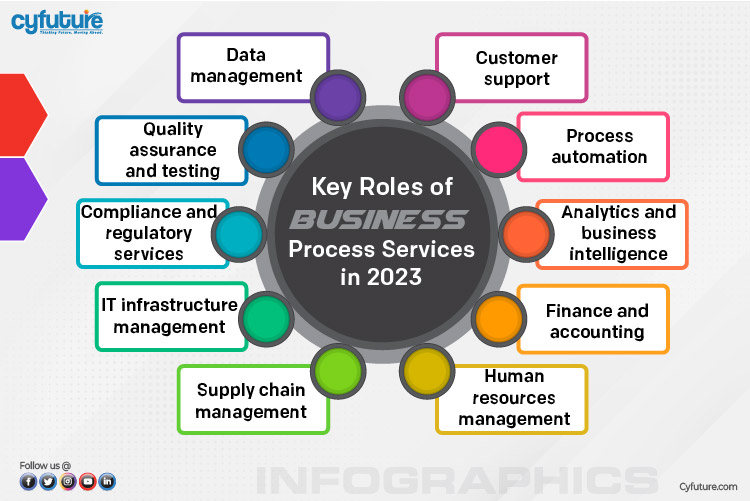Toggle navigation

Although Business Process Services (BPS) are often considered less significant compared to an organization’s core competencies, it is undeniable that these processes play a crucial role. While the core competencies of a business define its unique value proposition, the efficient management of business operations is equally vital for achieving a smooth workflow and fostering better collaboration.
Business Process Services encompass a range of activities that support the overall functioning of an organization. These services can include areas such as finance and accounting, human resources, customer service, procurement, and supply chain management. Although these functions may not directly contribute to a company’s primary products or services, they are essential for maintaining operational efficiency and ensuring the smooth functioning of the business.
Effective management of business operations involves streamlining processes, optimizing resource allocation, and implementing robust systems and technologies. By efficiently handling these non-core activities, organizations can focus their energy and resources on their core competencies, thus enhancing their competitive advantage in the market.
Moreover, efficient business process management enables better collaboration among different departments and teams within the organization. When processes are well-defined, tasks are clearly assigned, and communication channels are established, it promotes seamless coordination and enhances productivity. This collaboration leads to improved decision-making, faster problem-solving, and overall organizational effectiveness.

Technically speaking, Business Process Services (BPS) and Business Process Outsourcing (BPO) are often used interchangeably to refer to the various business processes required within an organization. However, upon closer examination, there are subtle distinctions that can be identified between the two.
While both BPS and BPO encompass the outsourcing of business processes, BPS incorporates an additional layer of technology. It is a comprehensive blend of people, processes, and technology that sets it apart from traditional BPOs. This integration of technology enables organizations to streamline their operations, automate repetitive tasks, and improve overall efficiency.
In recent years, there has been an evolution in the industry terminology. The term BPO has transitioned into BPS, and as of 2023, it is now referred to as Business Process Management (BPM). The shift in terminology reflects a broader focus on the management aspect of business processes. BPM emphasizes the strategic management of commercial processes, aiming to optimize and automate them to achieve organizational goals.
With the advent of advanced technologies such as artificial intelligence, robotic process automation, and data analytics, BPM has emerged as a comprehensive approach to managing and enhancing business processes. It involves designing efficient workflows, implementing intelligent automation, monitoring performance, and continuously improving processes to drive productivity and competitiveness.
The primary objective of BPM is to manage and automate an organization’s commercial processes, enabling it to operate more efficiently and effectively. By leveraging technology and aligning processes with organizational goals, BPM empowers businesses to achieve higher levels of productivity, cost savings, and customer satisfaction.
In conclusion, while BPS and BPO are often used interchangeably, BPS encompasses a fusion of people, processes, and technology. The industry terminology has shifted towards Business Process Management (BPM), which focuses on managing and automating commercial processes to drive organizational success in the modern business landscape.
Businesses have benefited from digital transformation, and how! Technology has benefited businesses, leading to cloud services. Business Process as a Service or BPaaS is a fully configurable cloud service that helps companies to stay on top of the best industry processes and practices. It takes business processes one step further by increasing efficiency and reducing costs and downtime. Businesses benefit through:
Implementing BPaaS enables businesses to enhance their product and service deliverability by leveraging advanced cloud-based technologies. With BPaaS, companies can streamline their business processes, automate repetitive tasks, and ensure smoother workflows. By eliminating manual errors and optimizing operations, BPaaS improves the overall quality and timeliness of product and service delivery. Additionally, the configurable nature of BPaaS allows businesses to align their processes with industry best practices, further enhancing customer satisfaction and loyalty.
One of the significant advantages of BPaaS is its ability to provide access to cutting-edge technology at reduced costs. By leveraging the cloud-based infrastructure and resources offered by BPaaS providers, businesses can tap into state-of-the-art technologies that would otherwise be costly to implement and maintain on their own. BPaaS eliminates the need for significant upfront investments in hardware and software, making it a cost-effective solution. Companies can benefit from the latest advancements such as AI, machine learning, data analytics, and automation tools, enabling them to stay competitive in the digital landscape without incurring substantial expenses.
The flexibility and scalability of BPaaS make it an ideal solution for accommodating fluctuating business needs. As businesses grow or experience changes in demand, BPaaS can easily scale up or down to meet evolving requirements. The ability to quickly adapt and adjust resources and capabilities ensures optimal efficiency and cost-effectiveness. Whether it’s scaling up during peak seasons or scaling down during slower periods, BPaaS allows businesses to align their operations with market dynamics. This agility helps organizations stay agile, responsive, and better equipped to handle the changing demands of their customers and the industry.
BPaaS’s unique operational flexibility and agility have made it one of the most preferred cloud services alongside infrastructure as a service (IaaS) and platform as a service (PaaS). It can be said that the future of BPS is BPaaS.

Technology is changing the fundamental nature of businesses. Organizations are now giving way to new-age technology-led innovative business models led by next-gen dynamics. The changing business landscape and customer expectations disrupt traditional cost versus labor-oriented business process services. BPS is used in several industries. Here are some critical roles of business process services standing in 2023:
While most businesses outsource processes to focus on their core competencies, some sectors rely mainly on outsourcing. Following are the industry sectors where there is a high prevalence of process services being outsourced:
IT: The IT industry extensively relies on business process services to streamline operations, manage software development, provide technical support, and handle data management and cybersecurity.
Banks: Banks outsource various processes, including customer support, account management, loan processing, and compliance, to improve efficiency, reduce costs, and enhance customer experience.
Airlines: Airlines outsource processes such as ticketing, reservations, baggage handling, and customer service to ensure smooth operations, enhance the passenger experience, and focus on core aviation functions.
Telecom: Telecom companies outsource processes like customer support, network management, billing, and technical support to optimize operations, improve service quality, and manage rapid technological advancements.
Insurance: Insurance companies outsource claims processing, policy administration, underwriting, and customer service to increase operational efficiency, handle complex regulations, and improve customer satisfaction.
Travel Agencies: Travel agencies outsource tasks such as booking management, itinerary planning, ticketing, and customer service to streamline operations, expand offerings, and enhance customer experience.
Asset Management: Asset management firms outsource back-office processes, including portfolio accounting, trade settlement, reporting, and compliance, to improve operational efficiency, reduce costs, and focus on investment strategies.
Government Sectors: Government sectors outsource various administrative processes, including payroll management, document processing, IT services, and customer support, to streamline operations and improve public service delivery.
Healthcare & Pharma: Healthcare and pharmaceutical industries outsource processes such as medical coding, billing, transcription, clinical trials, and data management to enhance efficiency, compliance, and focus on patient care and research.

Businesses can automate their processes and speed up their workflows. This increases productivity, reduces person-hours, and gives an overall competitive edge. Here are some examples of how automation of process services can help a business:
Some business process services need to be automated irrespective of the industry. Business Process Automation (BPA) is the use of software to automate repeated, multistage processes that would otherwise require long hours and other resources. Compared to other types of automation, BPA is tailored to the organization’s specific needs.
But BPA is often confused with Robotic Process Automation (RPA). While RPA uses software to mimic repetitive steps, BPA software tends to handle more complex tasks. Also, three factors distinguish between the two processes: integration, pricing, and workflows.
Examples of RPA include:
Although Business Process Automation may seem ordinary nowadays, it started with Henry Ford’s moving assembly line for his Model T cars back in 1913. Fast forward a century, computing power has increased a trillion fold, resulting in more rapid, better, and efficient business process automation. With business process services being automated at every step of the organizational function, some processes rarely need manual intervention. Here are a few processes that businesses automate for better cost efficiency and productivity:
Business Process Services play a crucial role in maintaining the efficiency of core organizational processes. By leveraging automated marketing tools, businesses can simplify post-order communication, resulting in streamlined operations and a reduction in high-risk orders. This automation contributes to enhanced customer support and experience, as businesses can promptly address customer inquiries and concerns. In today’s market, which places a strong emphasis on customer retention and engagement, automating business process services is not just beneficial but necessary. It allows businesses to allocate resources effectively, focus on building lasting relationships with customers, and deliver exceptional experiences that drive loyalty and growth. By embracing automation, businesses can stay competitive, improve operational effectiveness, and meet the evolving demands of their customer base.